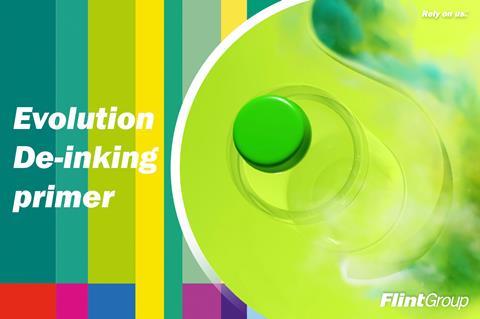
Next in our Finalist Interview series for the Sustainability Awards is Flint Group with its Evolution Deinking Primer. We spoke to the company’s R&D innovation manager Pierre Dogliani about this entry, which has been nominated in the pre-commercialized Driving the Circular Economy category.
You’re a finalist in the Sustainability Awards 2023. Congratulations! To start off, could you summarise your entry, in less than 50 words?
Evolution Deinking Primer prevents inks on labels and shrink sleeves from contaminating recycling streams. Helping to further close the packaging loop, the innovation increases the overall yield of plastic recyclate and helps printers’ control costs.
Why do you think the judges were impressed with your entry? Tell us about what is innovative about your project and/or about its impact on packaging sustainability.
Not all substrates are created equal when it comes to recyclability. Shrink sleeves for example, commonly used in combination with PET bottles, are typically non-recyclable and can prove to be a real ‘bottleneck’ in circularity.
Evolution Deinking Primer helps printers to prevent inks on shrink sleeves or labels from contaminating recycling streams during the recycling process – ultimately boosting yield.
When used with a crystallisable shrink sleeve label, Flint Group’s Flexocure ANCORA and EkoCure® ANCORA low-migration food packaging and label inks, it enables the deinking of sleeve materials during the washing process.
By ensuring shrink sleeve labels can be recycled with the bottle, the yield of commercially viable recycled material is increased and the time, energy use and costs associated with typical label removal processes are reduced.
How has your innovation/initiative been received?
Evolution Deinking Primer is pre-commercialised. During discussions with converters, brand owners and stakeholders across the value chain, this product has garnered significant interest. Our “plug & play” approach, which involves using a single primer to facilitate the de-inking process of the converter’s current ink system, eliminates the need for hybrid presses or specific investments. This allows for a seamless and swift transition of our customers’ prints to sustainable solutions.
The product has undergone validation in our laboratory as well as with selected customers. To ensure optimal performance throughout its life cycle we have conducted various tests focused on printability, sleeve performance, sleeve aging, and de-inking. Leveraging our dedicated Evolution laboratory in Trelleborg, Sweden, we have studied and minimised the impact of de-inking on PET flakes, PET sleeves and wash water.

You’re shortlisted for the pre-commercialized Driving the Circular economy category. What do you see as the key demands and challenges in relation to design for circularity in packaging?
Enormous leaps forward are being made in printing and packaging circularity, particularly when it comes to optimal use of resources and making more recycled materials available. We see the key demand from businesses being designing for circularity from the outset, including the use of materials that are easily recyclable, reusable, or compostable.
Perhaps the biggest shift on the sustainability horizon is a change in perspective from seeing sustainability as small, siloed changes to a broader, connected whole. We now consider the entire lifecycle of the product to evaluate its environmental impact, and the key challenge is maintaining the strong momentum that is building.
We see brands embracing the packaging industry’s innovations, but to maintain this long term we must prove that sustainability is not a compromise or a concession in other key areas such as quality or value.
What do you think are the main opportunities in this area or what future innovations do you predict in this area?
With widespread concern over the availability of recycled materials, compounded by inconsistent and often fractured recycling and recovery schemes from region to region, the path of innovation lies in boosting the accessibility of recycled materials. Translating this to industry technology, the core focus will be on substrates and materials, such as inks and coatings, that can actively increase the yield.
With circularity sitting at the front and centre of packaging sustainability discussion and a core drive to make better use of plastic resources, we must ensure that supply can keep up with demand – and that’s where we see real innovation being demonstrated.
The winners of the Sustainability Awards 2023 will be announced at the Sustainable Packaging Summit, which takes place in Amsterdam on 14-15 November. The Summit mobilizes leaders of the FMCG value chain, policymakers, NGOs, recyclers and investors to collaborate, remove barriers and identify opportunities on the road to sustainable transformation.
To learn more or register, visit https://www.packagingsummit.earth/amsterdam2023/.













No comments yet